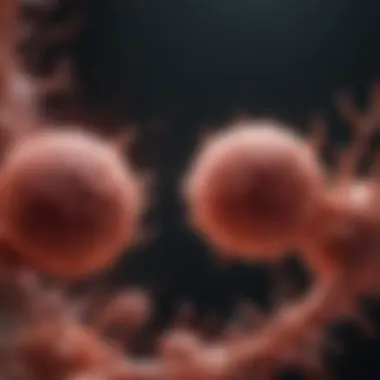Does Fasting Kill Cancer Cells? Insights and Evidence


Intro
Fasting has become a topic of intrigue within both scientific circles and popular health discussions. The question of whether fasting can influence cancer cell mortality forms the essence of this exploration. Cancer remains one of the leading causes of death worldwide, prompting researchers to investigate all possible avenues for treatment. Fasting, an ancient practice, has gained attention for its potential to affect biological processes at a cellular level. This article will delve into the mechanisms by which fasting may impact cancer cells, review notable studies, and analyze the broader implications for cancer treatment.
Research Overview
Summary of Key Findings
Numerous studies suggest that fasting may play a significant role in cancer treatment. Research indicates that fasting can induce cellular stress, leading to increased apoptosis or programmed cell death in cancer cells. Studies have showcased varying responses to fasting, with some types of cancer showing greater sensitivity than others.
Moreover, fasting appears to enhance the efficacy of chemotherapy by protecting normal cells while sensitizing cancer cells to treatment. Animal studies and preliminary clinical trials suggest promising results. However, the research is still in its infancy, demanding cautious interpretation.
Importance of the Research in its Respective Field
Understanding the relationship between fasting and cancer treatment is vital. Current cancer therapies often come with severe side effects, leading patients to seek complementary or alternative approaches. Identifying whether fasting can be an effective adjunct therapy may broaden the scope of patient care, providing new options for sustainability and quality of life.
Methodology
Description of Experimental or Analytical Methods Used
Most studies focus on controlled fasting protocols, such as time-restricted feeding or prolonged fasting periods. Research methods often include offering fasting regimens to select groups of patients or animals while monitoring their health markers and tumor responses. Various determinations are made using methods like immunohistochemistry and flow cytometry, assessing cancer cell viability and apoptosis rates post-fasting.
Sampling Criteria and Data Collection Techniques
Participants in these studies typically include individuals diagnosed with specific cancers or mouse models used for preclinical research. Data collection often involves detailed tracking of metabolic changes, tumor measurements, and patient-reported outcomes. Researchers evaluate the control and experimental groups over time to discern any significant changes.
"The potential of fasting as a therapeutic approach in oncology opens a new frontier in cancer treatment."
Preface to Fasting and Its Relevance in Oncology
Fasting emerges as a focal point in oncological research due to its potential impact on cancer therapy. The concept of fasting encompasses various modalities, from intermittent fasting to prolonged fasting, each possibly influencing cellular processes. Research increasingly explores how these practices might hinder cancer cell proliferation or enhance the efficacy of conventional treatments.
Fasting's relevance in oncology is underscored by its potential to modulate metabolic pathways. Cancer cells often thrive on glucose and other nutrients, which necessitate a deeper understanding of how fasting alters this dynamic. By depriving cancer cells of these resources, fasting may promote more favorable outcomes in patients undergoing treatment.
Moreover, fasting raises interest from both scientific and clinical perspectives. Some studies have indicated improvements in the response to chemotherapy when fasting is incorporated into treatment protocols. This understanding prompts a critical discussion on integrating fasting into existing cancer therapies.
Defining Fasting
Fasting is generally defined as abstaining from all or some types of food and drink for a specific period. It can take various forms, including:
- Intermittent fasting, where individuals cycle between eating and fasting periods.
- Prolonged fasting, which lasts for multiple days, often under medical supervision.
The physiological responses can vary based on the duration and type of fasting. For instance, autophagy, a process where cells degrade and recycle components, is particularly relevant during fasting periods. This mechanism can potentially lead to the elimination of damaged cells, including cancer cells.
Historical Context of Fasting in Medicine
Fasting has origins that date back to ancient civilizations, with roots in various cultures and religions. Historically, fasting was associated with spiritual purification and health benefits. In the medical realm, practitioners have utilized fasting as a therapeutic approach for various ailments.
In the 19th century, physicians often employed fasting as a remedy for conditions like obesity and diabetes. They recognized that caloric restriction could positively impact metabolic health. More recently, research has started to link fasting with cancer therapy, prompting inquiries into how ancient practices can be leveraged in modern medicine.


"Traditional medical practices, like fasting, are experiencing a renaissance as modern research uncovers their potential therapeutic benefits."
Understanding fasting’s evolution from a spiritual practice to a potential cancer therapy opens new pathways for research. It suggests that centuries-old knowledge may inform contemporary strategies in oncology.
Cancer Biology: A Brief Overview
Understanding cancer biology is crucial for comprehending the potential impacts of fasting on cancer cells. Cancer arises from the uncontrolled growth and proliferation of abnormal cells, which can lead to tumors and various malignancies. In this overview, we will explore the intricacies of cancer cell metabolism and the factors that influence cancer cell growth. Both elements serve as foundational knowledge for evaluating the effects of fasting in oncological contexts.
Understanding Cancer Cell Metabolism
Cancer cell metabolism significantly differs from that of normal cells. Cancer cells often demonstrate a substitution of oxidative phosphorylation with glycolysis, even in the presence of oxygen. This phenomenon, known as the Warburg effect, enables cancer cells to generate energy rapidly. This preference for glucose provides the necessary resources for aggressive growth. As cells consume glucose, they produce lactic acid, which can promote tumor microenvironment changes favoring cancer cell survival.
The metabolic alterations in cancer cells create a unique environment that may interact with fasting protocols. Fasting can potentially switch energy sources from glucose to fat, resulting in ketosis. This shift can deprive cancer cells of their preferred energy substrate. Moreover, fasting promotes various biochemical pathways that could induce cell death in cancer cells. Therefore, understanding these metabolic dynamics is vital to assessing fasting's effects on cancer cell viability.
Factors Influencing Cancer Cell Growth
Several factors contribute to the proliferation and spread of cancer cells. These factors can vary, but they generally include:
- Genetic Mutations: Genetic changes can alter cell growth signals and enable uncontrolled division.
- Microenvironment: The tumor microenvironment, including the presence of immune cells, vasculature, and extracellular matrix components, plays a significant role in tumor growth and progression.
- Hormonal Influences: Hormones can stimulate or inhibit cancer cell growth. For instance, estrogen has been linked to breast cancer proliferation.
- Nutritional Status: The nutritional state of an individual influences cancer cell growth. Availability of specific nutrients can either support or hinder cancer cell metabolism.
It is essential to recognize that these factors are interconnected. Changes in one aspect may have ripple effects on others.
Mechanisms of Action: Fasting and Cellular Pathways
Fasting has garnered attention as a potential strategy in cancer management due to its numerous biological effects on cellular pathways. Understanding the specific mechanisms by which fasting may influence cancer cell metabolism and behavior is essential for unraveling its therapeutic potential. This section delves into how fasting impacts crucial cellular functions, such as autophagy, insulin and glucose balance, and modulation of inflammation and the immune system. Exploring these mechanisms provides insight into the biological basis of fasting as a complementary approach to conventional cancer therapies.
Autophagy Induction During Fasting
Autophagy is a process that cell uses to degrade and recycle its own components, allowing for cellular maintenance and survival under stress conditions. During fasting, autophagy is significantly upregulated. This process helps in eliminating damaged proteins and organelles, which can prevent the accumulation of cellular waste that promotes cancer cell survival.
Studies suggest that fasting can stimulate autophagy, leading to the breakdown of dysfunctional cell components more effectively. This degradation can enhance cellular stress responses, ultimately leading to cancer cell death in some contexts. Autophagy induction may also improve the efficacy of cancer therapies by rendering cells more sensitive to treatment. Notably, blocking autophagy might counteract some benefits of fasting, necessitating a nuanced understanding of its role in cancer biology.
- Key benefits:
- Supports cellular repair mechanisms
- Enhances stress resistance in normal cells
- May improve treatment outcomes when combined with other therapies
Effects on Insulin and Glucose Levels
Fasting has profound effects on insulin and glucose metabolism. When food intake is restricted, insulin levels decrease, leading to a reduction in blood glucose. This shift is crucial as cancer cells often rely on glucose for energy. Lower glucose availability may create a hostile environment for cancer cell proliferation.
Several studies indicate that prolonged fasting can lead to a state known as ketosis, where the body burns fat instead of glucose for energy. This metabolic switch may inhibit cancer cell growth as they typically do not adapt as well to fat metabolism compared to normal cells. Furthermore, lower insulin levels can lead to reduced growth signaling, which is often overactive in cancer cells.
- Considerations:
- Monitoring blood glucose is vital during fasting protocols.
- Individual responses to fasting can vary significantly, necessitating personalized approaches.
Inflammation and Immune Response Modulation
Chronic inflammation is a known contributor to cancer development and progression. Fasting appears to exert anti-inflammatory effects, which may benefit cancer patients. During fasting, the production of pro-inflammatory cytokines is often reduced, while anti-inflammatory pathways may be upregulated.
This modulation of inflammation can lead to a more favorable immune response, enhancing the body's ability to combat cancer cells. Fasting may also promote the activation of immune cells, such as T cells and natural killer cells, which are critical in targeting and eliminating cancer cells.


- Fasting benefits for immune modulation:
- Increases resilience of immune cells
- Leads to reduction of pro-inflammatory markers
- Encourages a stronger immune response against tumors
The interplay between fasting, autophagy, insulin regulation, and inflammation suggests a complex relationship that warrants careful investigation. Understanding these connections is critical as future research may reveal optimal fasting strategies in combination with existing cancer treatment modalities.
Research Studies: Fasting and Cancer Outcomes
The relationship between fasting and cancer outcomes is an area of growing research interest. Understanding how fasting influences cancer cell behavior can provide great insight into potential therapeutic approaches. Fasting may bring various benefits, such as reduced tumor growth and improved response to treatment. However, this topic also includes considerations about the variability in individual responses and the potential risks involved.
Animal Studies Demonstrating Fasting Effects
Animal studies have played a significant role in understanding the effects of fasting on cancer. These studies typically involve rodents that are subjected to different fasting regimens. Findings from these studies indicate that fasting can lead to various beneficial effects on tumor dynamics. For example, some studies have shown that intermittent fasting reduced the size of tumors in mice, particularly in types such as breast and colon cancer.
Fasting appears to inhibit insulin signaling pathways, which are crucial for cancer cell metabolism. Lower insulin levels can lead to decreased glucose availability, potentially starving cancer cells. This effect is especially prominent in rapidly dividing tumor cells, which rely heavily on glucose for energy.
In one notable study, fasting was found to enhance the effectiveness of chemotherapy in rats. Tumor reduction was significantly greater in those animals that fasted compared to those that did not. Such findings underscore the need for further research on how fasting protocols might be applied in human cancer therapies.
Clinical Trials Involving Fasting and Cancer Treatment
Clinical trials are essential for translating findings from animal studies into human medicine. Some recent trials have explored the use of fasting or fasting-mimicking diets alongside traditional cancer treatments. These protocols aim to create a synergistic effect, where fasting enhances the efficacy of chemotherapy or radiation while protecting normal cells from damage.
One prominent trial focused on patients with breast cancer. Participants followed a fasting regimen before undergoing chemotherapy. The results hinted at improved tolerance to treatment and reduced side effects, indicating that fasting might optimize cancer care. Another study involving prostate cancer patients reported promising results regarding tumor markers in those who engaged in a fasting protocol compared to a control group.
However, the results are not universally applicable for all cancer types or patients. There is still a considerable need for larger, multicenter studies to confirm the effectiveness and safety of fasting in various contexts of cancer treatment.
Comparative Analysis of Fasting Protocols
Comparative analysis of different fasting protocols offers insights into their relative efficacy and safety. Various methods such as intermittent fasting, time-restricted feeding, and prolonged fasting have been explored. Each method presents unique metabolic effects, and their influence on cancer outcomes may vary.
Intermittent fasting involves cycling between periods of eating and fasting. This method has shown promise in restoring insulin sensitivity and reducing inflammation. On the other hand, prolonged fasting requires longer periods without food, allows autophagy to occur more extensively, leading to cellular repair or death of dysfunctional cells.
Research suggests that the effectiveness of fasting may depend on the type of cancer, treatment phase, and patient health condition. Thus, it is essential to develop personalized fasting protocols, taking into account the individual’s specific medical background and treatment plan. A more tailored approach may help optimize the benefits while minimizing risks.
“The future of cancer treatment may hinge on the understanding and integration of fasting as a complementary approach to traditional therapies.”
This comprehensive examination helps to elucidate the nuanced relationship between fasting and oncology. The insights gathered from animal studies, clinical trials, and protocol comparisons contribute to a growing body of knowledge that may influence future cancer treatment methodologies.
Challenges and Limitations of Fasting in Cancer Therapy
Understanding the challenges and limitations of fasting as a potential therapeutic approach in cancer treatment is absolutely crucial. While fasting shows promising results in various studies, it is important to recognize the complexity of cancer and the individual nature of patients. Each patient has unique physiological, psychological, and health considerations that can affect how they respond to fasting. Therefore, identifying and addressing these challenges is essential for integrating fasting into clinical practice.
Patient-Specific Considerations
When discussing fasting in the context of cancer therapy, one must consider the specific situations of each patient. Factors such as age, overall health, stage of cancer, and concurrent treatments play significant roles.
- Age and Comorbidities: Older patients or those with multiple health issues may not tolerate fasting as well as healthier individuals. This can increase the risk of complications.
- Nutritional Status: Patients already facing malnutrition due to cancer or treatment side effects may struggle with fasting, possibly worsening their condition.
- Psychological Factors: Anxiety around fasting can deter patients from adhering to protocols. Weight loss concerns may also impact their willingness to participate in such regimens.
In essence, personalized approaches are key to optimizing the potential benefits of fasting. Doctors must carefully evaluate each patient's circumstances before recommending any fasting protocols.


Potential Side Effects of Extended Fasting
Extended fasting can lead to several side effects which cannot be overlooked. While some of these may seem manageable, they can significantly impact a patient's quality of life and overall treatment experience.
- Electrolyte Imbalance: Prolonged fasting may cause imbalances in electrolytes, leading to complications such as arrhythmias.
- Fatigue and Weakness: Many patients report increased fatigue, which can be particularly detrimental during cancer treatment when energy levels may already be low.
- Immunity Issues: Extended calorie restriction could impair immune responses, counteracting the desired effects of fasting on cancer cells.
Given these risks, it is essential to monitor patients regularly and assess their wellbeing when implementing fasting protocols. Fasting must not only aim to target cancer but also should prioritize the patient's overall health and safety.
Ethical Concerns Surrounding Fasting Protocols
The use of fasting in cancer therapy also raises various ethical considerations. Addressing these concerns is fundamental to fostering trust and transparency between healthcare providers and patients.
- Informed Consent: Patients should be fully aware of both potential benefits and risks associated with fasting. Informed decision-making is a cornerstone of ethical medical practice.
- Access to Care: Not all patients have equal access to the support or guidance required for fasting protocols, which can create disparities in treatment outcomes.
- Exploitation Risks: There is a potential for unregulated practices or unproven therapies that exploit patients' hopes. Medical professionals must take care to maintain integrity in recommending fasting as a treatment option.
These ethical considerations highlight the need for a careful, measured approach to fasting in cancer therapy, ensuring that patient welfare remains at the forefront of any treatment plan.
Future Directions: Research and Clinical Applications
The exploration of fasting as a potential adjunct therapy in cancer treatment embodies a crucial intersection in modern oncology. Understanding how fasting can be integrated with existing treatment paradigms opens avenues for improving patient outcomes. This section focuses on emerging technologies, methodologies, and integrative approaches that warrant further examination.
Emerging Technologies and Methodologies
Advancements in biotechnology and medical research present new frameworks through which the effects of fasting on cancer can be studied. Recent years have seen the development of high-throughput screening methods and sophisticated metabolic profiling techniques. These technologies enable researchers to observe the metabolic changes in cancer cells during fasting periods with greater precision.
One pivotal technology is mass spectrometry-based metabolic flux analysis. This technique allows scientists to track the flow of nutrients through metabolic pathways. As a result, they can identify how fasting alters the bioenergetics of cancer cells. Understanding these biochemical nuances can facilitate the development of targeted interventions tailored to enhance the benefits of fasting.
Moreover, there are computational modeling approaches that simulate the effects of fasting on cellular growth and division. These models can predict how different fasting regimes might work synergistically with chemotherapy or radiotherapy. Ultimately, these technologies provide a framework for developing precise fasting protocols that could potentially maximize patient benefits while minimizing risks.
Integrative Approaches: Fasting with Conventional Treatments
Combining fasting with conventional cancer therapies raises exciting possibilities for enhancing treatment efficacy. One area of interest is the timing of fasting in relation to chemotherapy administration. Research suggests that fasting might sensitize certain tumors to chemotherapy agents, improving their efficacy. This phenomenon could stem from fasting-induced metabolic changes that heighten the vulnerability of cancer cells to cytotoxic drugs.
Furthermore, integrating fasting with immunotherapy could prove advantageous. Studies indicate that fasting can modulate immune responses, potentially leading to better outcomes when combined with immune checkpoint inhibitors. The gentle stress fasting places on the body may enhance the visibility of tumor cells to the immune system, providing greater impetus for immune engagement.
"Fasting opens the door for innovative combination therapies that can potentially rewrite treatment protocols."
However, this integrative approach necessitates careful consideration. Not all patients may tolerate fasting alongside their treatments. Therefore, clinical trials are essential to establish optimal fasting regimens that minimize adverse effects while maximizing therapeutic efficacy. In this context, informing patients and practitioners about these emerging approaches will be vital as research unfolds.
Ultimately, the integration of fasting with traditional cancer therapies offers a multi-faceted strategy for improving outcomes. Addressing patient-specific considerations and navigating the complexities of these combinations will be fundamental as the medical community evaluates the true viability of fasting in contemporary cancer treatment.
End: Assessing the Viability of Fasting as Cancer Therapy
The exploration of fasting as a potential therapeutic strategy in cancer treatment is both compelling and multifaceted. This conclusion seeks to synthesize the information discussed throughout the article, emphasizing the interplay between fasting and cancer cell dynamics. While the body of research presents promising insights, it also raises crucial considerations about the actual implementation of fasting protocols.
Summarizing Current Understanding
The current understanding of fasting's effects on cancer cells can be summarized by examining its biological mechanisms. Fasting has been shown to induce autophagy, alter insulin and glucose levels, and modulate inflammation and immune responses. These mechanisms can create a less hospitable environment for cancer cell proliferation. Several studies, including animal models and clinical trials, suggest that fasting may enhance the efficacy of conventional cancer treatments like chemotherapy and radiation.
However, while these findings are encouraging, it is essential to recognize the variability in individual responses to fasting. The oncological landscape is complex, and factors such as tumor type, stage, and patient health can influence the outcomes of fasting interventions.
Final Thoughts on Fasting and Cancer Treatment
"Fasting should not be viewed as a standalone treatment but rather as an adjunct to traditional cancer therapies."
The potential benefits must be weighed against patient-specific considerations, including potential side effects and the need for ethical guidelines. Integrated approaches that combine fasting with personalized cancer treatment regimens could pave the way for more effective outcomes.
As research advances, the viability of fasting as a cancer therapy will likely depend on further studies aimed at understanding the optimal fasting protocols and their interplay with existing treatments. Thus, ongoing inquiry and clinical trials will be essential to fully evaluate fasting’s role in oncological care.







